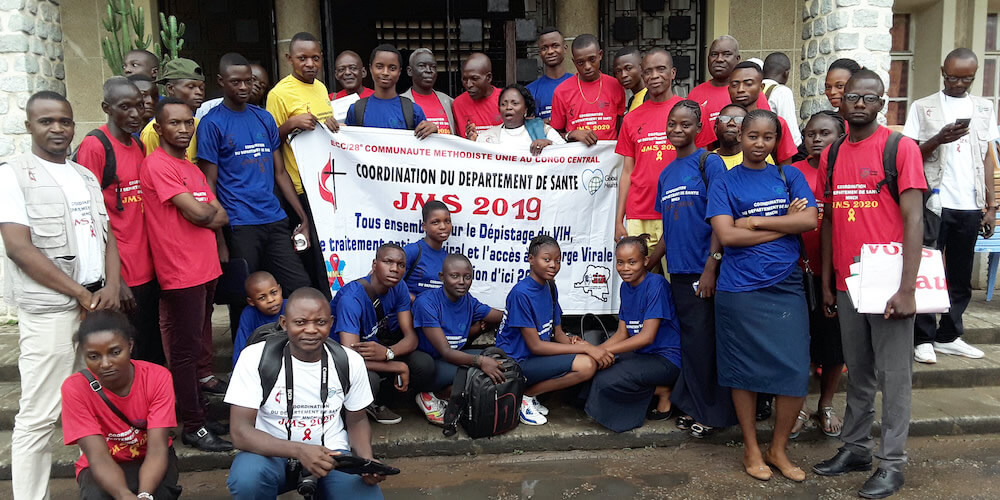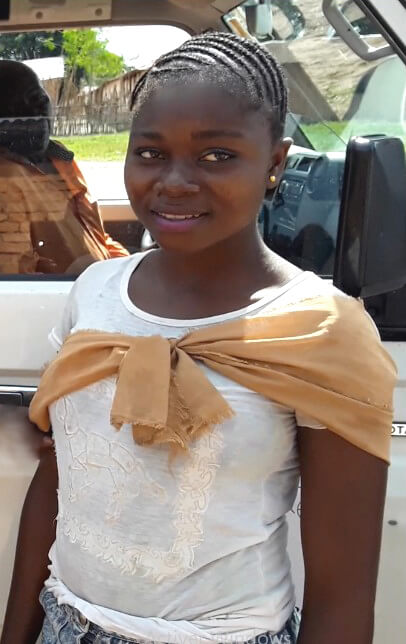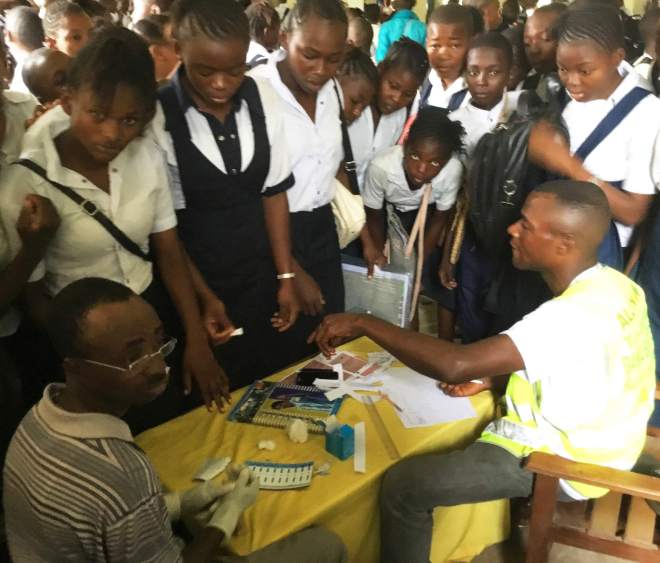
Central Congo UMC Health Board HIV-awareness training taught to students in UMC schools, who in turn teach fellow students, December 2019. PHOTO: CENTRAL CONGO UMC HEALTH BOARD
By Christie R. House
December 1, 2020 | ATLANTA
Marie Ange, a high school student of the Wembo Nyama Institute in Central Congo, knew that the United Methodist Health Board of Central Congo was coming to her school to conduct HIV (human immunodeficiency virus) awareness training and offer free HIV tests, but she was afraid to be tested. Her aunt and her aunt’s close friend had recently died from AIDS (acquired immunodeficiency syndrome), and her uncle was now very sick too.

PHOTO: CENTRAL CONGO UMC HEALTH BOARD
“We were often with my aunt, and my heart was not at peace. We ate together many times, and we spent the night together with her,” Ange remembered. Although she didn’t feel sick, Ange believed her whole family must be very sick, and that all of them would eventually suffer the same fate as her aunt and uncle.
But when the Central Congo health team arrived, led by the Mother, Newborn and Child Health coordinator, Denise Mondji, Ange attended and listened intently at the training session. She learned that HIV is not transmitted like Ebola, or COVID-19 or even malaria. HIV can only be transmitted through the direct exchange of body fluids.
“They had clear answers to our questions,” Ange explained. “So, I took courage and overcame my fear and lined up to be among the first 25 volunteers to be tested.”
Ange’s test came back negative for HIV, and that changed her whole outlook on her life. She had believed she would live a short life, expecting to die soon. But with her new knowledge, she is now determined to protect herself and to advise her loved ones to be tested and learn their status too. Prevention from transmission is possible, but even a positive test can prompt a patient to seek further help, including regular doctor’s visits and antiretroviral drugs, so the patient can live longer and healthier with HIV.
World AIDS Day on December 1 each year urges the world community to remember people like Marie Ange, a young student who gained a new perspective on her life with a little knowledge and a simple blood test. Unfortunately, the COVID-19 pandemic may cause an increase in the number of people with HIV and a decrease in peoples’ access to counseling, testing and treatment. Stigma and fear of both infections are harmful. The United Nation’s theme this year for World AIDS Day is “Global Solidarity, Shared Responsibility.” United Methodists, through Global Ministries’ Global Health work, walk in solidarity and share the responsibility for educating and caring for people affected by HIV and AIDS every day of the year.

PHOTO: CENTRAL CONGO UMC HEALTH BOARD
Healthier communities help everyone
The Central Congo Episcopal Area Health Board carried out its HIV and AIDS educational and screening campaign with grant support from Global Health through the United Methodist Global AIDS Fund Advance. In addition, Global Health and the United Methodist Committee on Relief have been working to help United Methodist hospitals in the DRC and across Africa to combat HIV and AIDS and other diseases such as malaria, rebuild or renovate and resupply health facilities, drill wells and establish safe water storage, and improve sanitation. By supporting Global Health, United Methodists take responsibility for better health measures across United Methodist health boards in 10 countries of Africa.
These efforts increase access to health care and improve health statistics for whole communities, especially for women and children. With a commitment to women’s rights and gender equity, Global Health’s Maternal, Newborn and Child Health program strongly promotes HIV screening for all pregnant women who come to United Methodist facilities for prenatal care. They also receive screenings and treatment for other diseases that might affect mother and child health. A confirmed case of HIV in a mother does not necessarily mean her newborn will be born HIV positive. If the diagnosis is made early, a mother can start antiretroviral drugs, which not only help her remain strong and well, but can actively prevent transmission of the virus to her baby.
Joining in global solidarity to advocate for people with HIV and AIDS and sharing responsibility to improve the health of whole communities are actions that United Methodists have long practiced as part of their commitment to live their faith in their daily lives. This World AIDS Day, consider a gift to the United Methodist Global AIDS Fund-Advance # 982345.
Christie R. House is a consultant writer and editor with Global Ministries and UMCOR.

